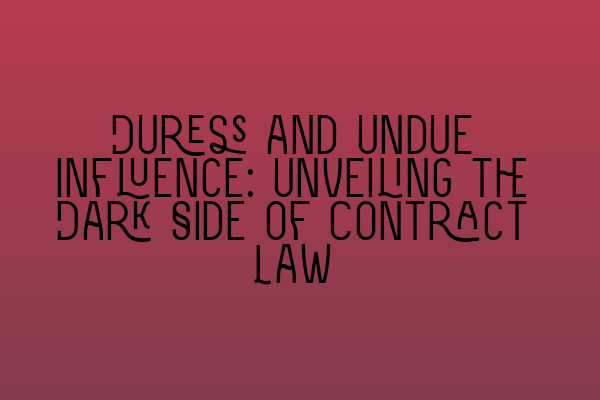Duress and Undue Influence: Unveiling the Dark Side of Contract Law
Welcome to SQE Contract Law, your trusted source for all things related to contract law. In this blog post, we will delve into the dark side of contract law and shed light on two important concepts: duress and undue influence. These concepts play a significant role in determining the validity of a contract, and understanding them is crucial for both solicitors and clients alike.
Before we dive deeper into duress and undue influence, let’s take a moment to understand what they actually mean. Duress refers to a situation where one party has been coerced or forced into entering a contract against their will. Undue influence, on the other hand, involves a situation where one party exerts their influence and exploits the vulnerability of another party to gain an unfair advantage.
Now, let’s explore each of these concepts in detail:
Duress
Duress is a key consideration in contract law, as a contract entered under duress lacks the necessary element of free consent. The coercive actions of one party may include physical threats, imprisonment, economic pressure, or even blackmail. When faced with such duress, individuals may feel compelled to enter into a contract they would have otherwise avoided.
In order to prove duress, the party alleging duress must demonstrate that their consent was not given voluntarily and that the other party’s actions were responsible for their entry into the contract. It is worth noting that economic pressure or an unfair advantage alone may not be sufficient to establish duress; there must be an element of coercion or force involved.
Unveiling Real-Life Case Studies: Insights into Legal Practice and Decision-Making, provides fascinating real-life examples of cases involving duress, giving readers an in-depth understanding of how it applies in practice.
Undue Influence
Undue influence differs from duress in that it involves the exploitation of a special relationship or a position of power to exert influence over another party. The party exerting the undue influence manipulates the vulnerable party into entering into a contract that benefits them at the expense of the other party.
Special relationships that can give rise to undue influence include those between partners, family members, or individuals in a fiduciary relationship. In such cases, there is a presumption of undue influence, and it is up to the party accused of exerting undue influence to prove that the contract was entered into freely and voluntarily.
Exploring Solicitor Salaries in the UK: Average Earnings and Factors Affecting Income can be a valuable resource for solicitors working on cases involving undue influence, as it sheds light on the financial aspects of a solicitor’s practice.
Challenging Duress and Undue Influence
If a contract is tainted by duress or undue influence, it may be considered voidable, allowing the affected party to set it aside. However, it is important to note that the burden of proof rests with the claiming party to establish the presence of duress or undue influence.
In order to successfully challenge a contract based on duress or undue influence, it is crucial to gather evidence that clearly demonstrates the coercion, exploitation, or manipulation involved. Witness statements, email exchanges, or expert opinions can all play a significant role in supporting the claim.
Mastering Client Relationship Management: Skills for Solicitors to Enhance Trust and Loyalty can provide valuable insights into the process of building strong relationships with clients who have been affected by duress or undue influence, helping solicitors navigate these complex situations with empathy and professionalism.
Conclusion
Duress and undue influence are integral aspects of contract law, representing the darker side of legal agreements. Understanding these concepts is essential for solicitors and clients alike, as they directly impact the validity and enforceability of contracts.
By familiarizing ourselves with the signs of duress and undue influence, and by staying informed about relevant case studies and best practices, we can ensure that contracts are entered into freely and voluntarily, without any undue pressure or influence.
If you’re interested in learning more about contract law or other topics related to legal practice, feel free to check out our other articles:
- Exploring Solicitor Salaries in the UK: Average Earnings and Factors Affecting Income
- Mastering Client Relationship Management: Skills for Solicitors to Enhance Trust and Loyalty
- Pursuing a Law School Education in the UK: Choosing the Right Path for Your Future
- Securing Training Contracts: A Roadmap to Becoming a Solicitor
Thank you for reading! If you have any questions or would like to discuss a contract law matter further, please don’t hesitate to contact us. We are always ready to assist you with our expertise and knowledge.
